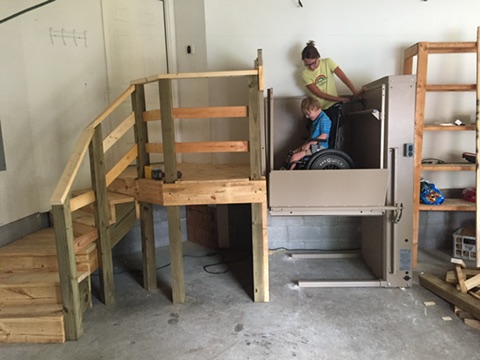
Ten years ago, Sunny Rosanbalm noticed that her daughter-in-law was having trouble lifting and maneuvering her son in their home. At three years old, Tucker was growing fast, making it harder for his mother to carry him in and out of the house. Because Tucker experienced numerous seizures as a baby, he could not walk or talk. It soon became apparent that the house they occupied did not meet Tucker and his family’s needs.
Sunny realized something had to change. After conducting her own research and holding multiple meetings, she discovered there was no assistance that would meet her son and daughter-in-law’s needs. Coming from an architectural design background, Sunny decided to start Tucker’s House, a nonprofit that builds and creates solutions for accessible housing.
“We didn’t realize how big the need was until we were in it,” Sunny says of Tucker House’s early days.
Tucker’s House has grown immensely over the years and has assisted many Tennessee families in their search for better housing accommodations. Today, Sunny works alongside a pediatric physical therapist and another architect to evaluate home requests. Tucker’s House helps children and young adults up to age 22 and their families find the accessible housing answers they need. These answers include building ramps, new flooring, widening doors, expanding bathrooms, installing lifts and other accessible equipment, and more.
Recently, Tucker’s House has been partnering with Belmont University to invite students to intern with the organization. The goal is to help students learn how important inclusive design is when it comes to housing. Sunny wants to raise awareness that accessible housing is more than what the Americans with Disabilities Act (ADA) says.
“Accessible housing goes way beyond the basic requirements of the (ADA). It’s about truly incorporating inclusive design into every home.”
Tucker’s House has also been a point of reference for many architects, builders, and businesses, who have contacted the organization for guidance on how to not only comply with the ADA, but meet clients’ needs. As a result of this new development, the organization is putting together a detailed assessment package for these same groups to use when making plans for a new home or place of business.
A future goal of Sunny’s involves streamlining Tucker’s Houses processes so that similar models can be implemented across the U.S. This way, more families and individuals can find the assistance they need to thrive in their homes. Sunny notes that accessible housing is not just for people with disabilities; it’s also for visiting family and friends. Universal design fits everyone’s needs.
“To be able to raise up the next generation of designers, architects, and builders to be aware of inclusive and accessible housing is what I’m passionate about. It’s not just about the ADA, it’s about inclusion. We need to have this conversation now so that we aren’t facing the same issues down the road.”
Tucker’s House recently became a member of the Tennessee Disability Coalition. If you would like to learn more about Tucker’s House, visit http://www.tuckershouse.org/.
If you would like to learn more about becoming a member of the Tennessee Disability Coalition, visit https://www.tndisability.org/membership-and-board.